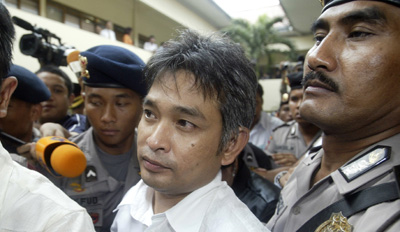Erwin Arnada turned himself in to authorities at Cipinang prison in East Jakarta on October 9 to start serving a two-year sentence for public indecency. His conviction stemmed from pictures he published in a 2006 issue of the now-defunct Indonesian edition of Playboy magazine. On September 30, CPJ called on President Susilo Bambang Yudhoyono and Supreme Court Chief Justice Harifin Tumpa to allow Arnada to remain free while the Court heard his appeal.
According to his lawyer, Todung Mulya Lubis, Arnada is being held in the general population. His legal team is appealing his conviction, but the full process will take about one year, Lubis says.
Cipinang is a high-security facility, built by the Dutch during colonial rule. It has often been used to hold political activists, especially during the 32 years of the Suharto presidency. It’s a tough and dangerous place. Some of Cipinang’s cells hold prisoners accused of terrorism. Gang members stir violence inside the fortress-like compound. According to the Jakarta Post, “Two inmates died and five others were seriously injured when armed gangs clashed inside Cipinang” in August 2007.
Of course, Arnada should not be in prison at all; his conviction should be overturned. He is a magazine editor who cooperated with the government through a two-year long judicial process. His innocence was supported by two lower court rulings. Indonesian Playboy, which closed in mid-2007 after printing 10 issues, was a lot less racy than what is generally available on the country’s newsstands, leading Arnanda and his legal team to believe he was singled out for political harassment by conservative Islamic groups. Throwing him into a facility like Cipinang is judicial overkill.
It’s also a step backwards for a country that has otherwise made great strides away from the repressive era of Suharto’s presidency.
On Thursday, Indonesia’s nine-judge
Book-banning powers are a largely considered a holdover from the Suharto era yet, as recently as December 2009, the Attorney General’s Office banned five books. The Southeast Asia Press Alliance has a list of the banned books here, as well as a statement signed by 82 authors and activists calling for the government to abolish “its apparatus which is still practicing the behavior of the ancient anti-democratic regime.”
Their point: The law became an anomaly after Suharto resigned in 1998, when Indonesia began to move toward becoming one of Southeast Asia’s best examples of democracy. Successive presidencies successfully balanced democratic policies with the expectations of its predominantly Islamic culture. Indonesia is the world’s largest Islamic country, with more than 240 million people, 95 percent of them Muslim. It is also considered the world’s third-largest democracy.
Thursday’s ruling didn’t rule out book-banning altogether, unfortunately. The government is still allowed to temporarily ban a book while its case against the book moves through the courts. And of course, the anti-pornography laws that resulted in Erwin Arnada’s imprisonment are still part of the system.
If Indonesian officials are truly committed to stepping out from the shadow of the Suharto era, these things must change.
